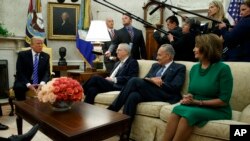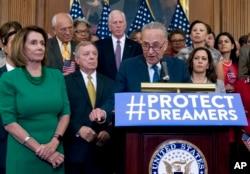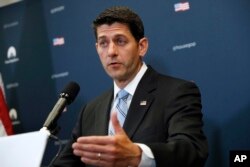Congressional Republicans, facing a fresh round of revelations that President Donald Trump was working with their Democratic counterparts on key fiscal and immigration issues, spent Thursday coming to terms with a level of cooperation that's rarely invoked on Capitol Hill.
The revelations came just a day after Trump blindsided Republican Congressional leaders, siding with Democrats on a three-month debt-ceiling extension that puts his own party in an awkward spot with mid-term elections little more than a year away.
"I'm focused on taxes," said House Ways and Means Chairman Kevin Brady, a Republican from Texas, after reporters informed him of a potential deal between Trump and Democratic Senator Chuck Schumer to end Congressional votes on the debt ceiling.
The ability to raise the debt ceiling is a core issue for many Republicans, who say it would be fiscally irresponsible to take away Congress' ability to consider spending levels before increasing the nation's credit level.
But Trump diverged from his own party, telling reporters Thursday the debt ceiling "complicates things, it's really not necessary. Because you're talking about budget, so it's really not necessary."
Earlier Thursday, following a phone call with House Democratic Minority Leader Nancy Pelosi, Trump issued a tweet telling those affected by the end of the Deferred Action for Childhood Arrivals program that they have nothing to worry about. Pelosi confirmed to reporters that she had asked Trump to tweet that assurance.
"The people of the United States want to see a coming together — at least to an extent — with different parties," the president told reporters Thursday. "We have different thoughts, different feelings, different ideas, but I think you're going to see a much stronger coming together."
Bipartisanship?
Some Republicans on Capitol Hill, reacting to news of the Trump deal, acknowledged the popularity of his approach.
"From what I hear back home, Trump's populism is real," Representative Barry Loudermilk, a Republican from Georgia, told VOA. "People are very supportive of his ideas going forward. And they want us to come up here and just deal with the nuances of how you do it."
Loudermilk — who is from a district that gave Trump an overwhelming victory over Democratic presidential candidate Hillary Clinton in the 2016 election — said the negotiations with Democrats were "internal politics."
But for Texas Republicans looking to send aid to their hurricane-stricken state, the deal puts them in the position of voting for aid for victims of Hurricane Harvey while raising the debt ceiling.
"I would have liked to have seen them as separate issues and I'm disappointed that they're together, but there's plenty of blame to go around," said Representative Blake Farenthold, a Republican from Texas.
"I don't think the folks that voted for Donald Trump in the district I represent want to see him working with Miss Pelosi. I don't think a lot of his base will be happy," he added.
Another Republican member of the Texas delegation told VOA that while he still trusted the president and House Speaker Paul Ryan, he wondered how long cooperation with Democrats could last.
"It may be something where there is a feeling of euphoria today, but then there's always the hangover that comes the next day. So, there will be a hangover from the decision," said Representative Bill Flores. "I'm not being critical of the president — he did what he thought he had to do — but we'll see how it works. Not only this week, but longer term."
Focus on tax reform
The chairman of the conservative House Freedom Caucus, Representative Mark Meadows, was conciliatory. At a Bloomberg News breakfast meeting Thursday with congressional reporters, Meadows said Trump told him he had cut the debt ceiling deal so he could focus attention on tax reform. Trump is "myopically focused on trying to get tax reform," Meadows said.
The deal left Republican congressional leaders, Senate Majority Leader Mitch McConnell and Ryan, in an embarrassing position. Hours before meeting Trump with other congressional leaders Wednesday at the White House, Ryan had called the idea of a three-month debt extension "ridiculous," telling reporters it was "disgraceful that they [Democrats] want to play politics with the debt ceiling."
Senate Minority Leader Chuck Schumer called the deal a "positive step forward" that would avoid default and get money quickly to hurricane victims in Texas and Louisiana. "The nation can breathe a sigh of relief," Schumer said Thursday on the Senate floor.
Several Senate Republicans tried to put the best face they could on the deal.
"The Senate will soon consider legislation that will keep the government's lights on until December 8, and increase the nation's borrowing capacity," said Senate Majority Whip John Cornyn. "That's important, because without lifting the debt limit, we couldn't actually vote for and send aid to the victims of Harvey."
Nebraska Senator Ben Sasse mocked the deal in a news release, calling on fellow Republicans to reject it. "Yesterday we saw Washington's swamp continue to rise: Chuck Schumer wrote the art of the steal by taking hurricane relief hostage to guarantee a December showdown that favors Democratic spending priorities," Sasse said.
Ryan was more reflective at a meeting with reporters Thursday, saying the president had made clear he was looking for a "bipartisan moment," with the country facing two hurricanes, when he agreed to the three-month debt-ceiling extension. Ryan said his objection was based more on the effect the deal would have on financial markets.
"I was making an economic point," Ryan said, "which is that with respect to the credit markets, stability and longevity are key."
White House Press Secretary Sarah Huckabee Sanders issued a statement confirming that Trump held early-morning conversations Thursday with McConnell and Schumer, as well as Ryan and Pelosi.
"The president is committed to working across the aisle and doing what is needed to best serve the American people," Sanders said.






